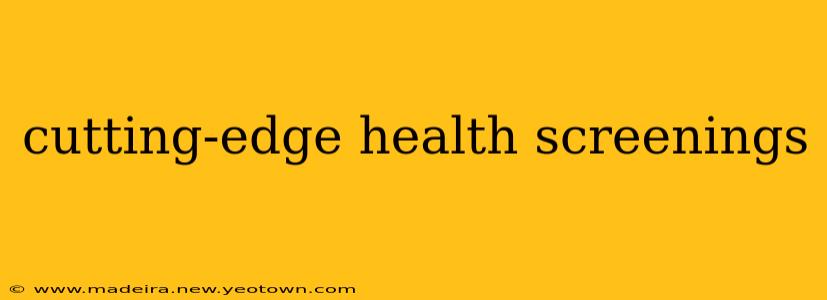Imagine a world where diseases are detected long before symptoms even appear, giving you the power to take proactive steps towards a healthier future. This isn't science fiction; it's the promise of cutting-edge health screenings. These innovative technologies are transforming preventive care, offering earlier diagnosis, personalized treatment plans, and ultimately, better health outcomes. Let's delve into the exciting advancements reshaping how we approach wellness.
What are the latest advancements in health screening technology?
The landscape of health screenings is constantly evolving, with new technologies emerging at a rapid pace. Some of the most groundbreaking advancements include:
-
Liquid Biopsies: Forget invasive procedures! Liquid biopsies analyze blood samples to detect cancer cells and genetic mutations, allowing for early cancer detection and personalized treatment strategies. These tests are becoming increasingly sensitive and accurate, offering a less invasive alternative to traditional biopsies.
-
Advanced Imaging: MRI, CT scans, and PET scans are becoming more sophisticated, offering higher resolution images and more precise diagnostic capabilities. This allows for earlier detection of abnormalities, leading to improved treatment outcomes. AI is also being integrated into image analysis, helping radiologists identify subtle changes that might otherwise be missed.
-
Genetic Testing: Understanding your genetic predisposition to certain diseases can empower you to make informed lifestyle choices and seek preventative measures. Genetic screenings are becoming more accessible and affordable, providing valuable insights into your individual health risks.
-
Artificial Intelligence (AI) in Diagnostics: AI is revolutionizing diagnostics by analyzing medical data—including images, lab results, and patient history—to identify patterns and predict potential health risks with greater accuracy than ever before. This technology is improving the speed and accuracy of diagnosis across various conditions.
What are some examples of cutting-edge health screenings?
Let's look at some specific examples of these cutting-edge technologies in action:
-
Early Detection of Alzheimer's Disease: New biomarkers and imaging techniques are being developed to detect Alzheimer's disease in its early stages, potentially years before the onset of symptoms. This allows for earlier intervention and management of the disease.
-
Cancer Screening Revolution: Liquid biopsies are changing the game in cancer screening, allowing for the detection of circulating tumor DNA (ctDNA) in blood samples. This non-invasive approach is particularly valuable for early detection of cancers that are difficult to diagnose through traditional methods.
-
Personalized Medicine: Genetic testing combined with advanced analytics is paving the way for personalized medicine. This approach tailors treatments based on an individual's genetic makeup, ensuring the most effective and targeted care.
How accurate are these new health screenings?
The accuracy of these new screenings varies depending on the specific technology and the condition being screened for. While many offer significant improvements over traditional methods, it's crucial to understand that no test is perfect. False positives and false negatives can occur. It's essential to discuss the accuracy and limitations of any screening test with your healthcare provider to make informed decisions.
What are the benefits and drawbacks of these new health screenings?
Benefits:
- Early Disease Detection: Leading to improved treatment outcomes and increased survival rates.
- Personalized Treatment: Tailoring treatment plans to individual needs for optimal results.
- Reduced Healthcare Costs: Early detection can prevent costly and extensive treatments later on.
- Improved Quality of Life: Early intervention can help manage chronic conditions and maintain a higher quality of life.
Drawbacks:
- Cost: Some cutting-edge screenings can be expensive and may not be covered by insurance.
- Accessibility: Access to these technologies may be limited depending on location and resources.
- Potential for Anxiety: Receiving a positive result can cause significant anxiety, even if the condition is treatable.
- Ethical Concerns: Issues surrounding genetic privacy and data security need careful consideration.
Are these screenings available to everyone?
Currently, access to these cutting-edge screenings varies greatly depending on location, insurance coverage, and individual health needs. While some screenings are widely available, others are still in the research or early adoption phases. The cost can also be a significant barrier for many individuals. However, as technology advances and costs decrease, these innovative screenings will likely become more accessible to a broader population.
What are the future implications of these advancements in health screening?
The future of health screenings is bright, promising a revolution in preventive care. We can expect even more precise, personalized, and accessible screenings, leading to earlier disease detection, improved treatment strategies, and a significant increase in healthy lifespans. The integration of AI and big data analytics will further refine diagnostic capabilities, allowing for more accurate risk assessments and proactive interventions. The journey towards a healthier future is well underway, and cutting-edge health screenings are leading the charge.

